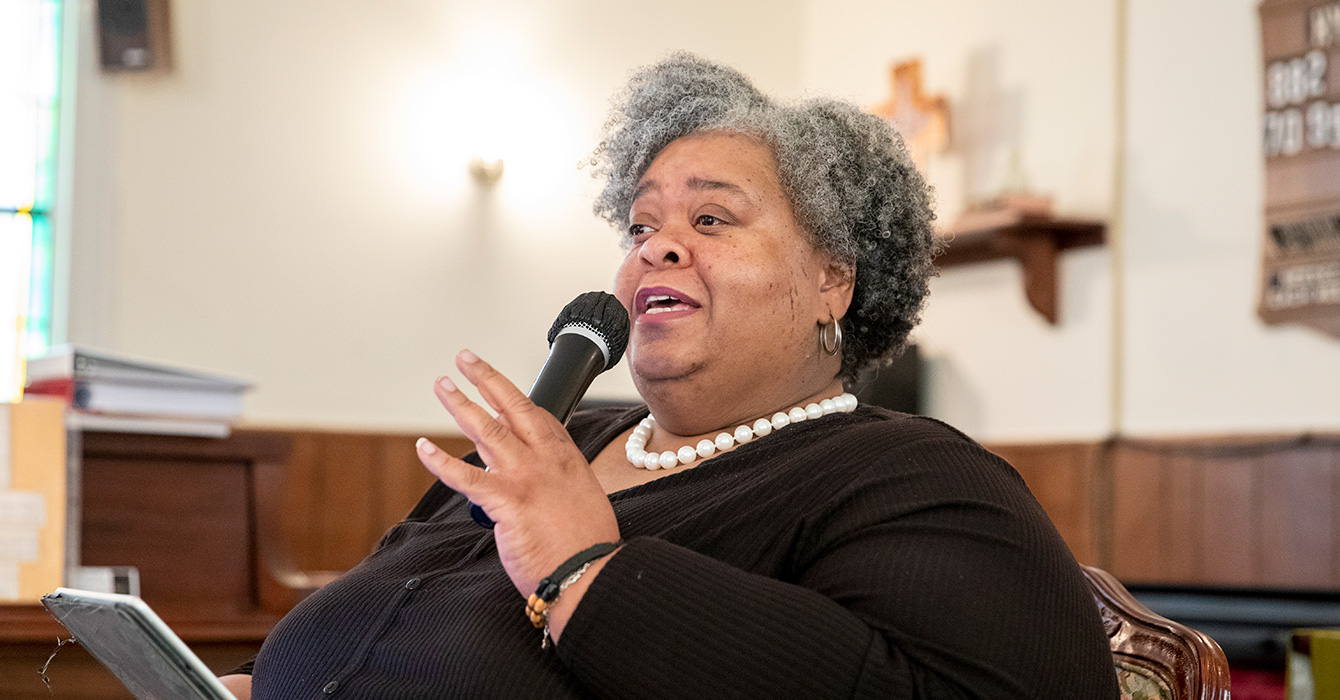I sat in the pulpit on a recent Sunday, listening to our extraordinary choir singing J.J. Hairston’s “You Deserve It.” Their voices rose with the opening line of the gospel song, which promises everything to the Lord: “My hallelujah belongs to you.”
I looked around and wondered, “Am I crazy for leaving?”
Six years ago, when I joined the ministerial staff of my current church home, I was told that no one leaves here. The consensus is that there’s nowhere to go from here. This is the top.
My church could be considered the Disney World of the African Methodist Episcopal churches in my region. We have three locations, state-of-the-art facilities, a robust youth ministry, music ministry directors who are also recording artists, and a membership so large that I stopped counting once we grew beyond 12,000 people.
Like me, our members are well-educated and upwardly mobile. Many have moved to Prince George’s County -- the nation’s highest-income majority-black county -- for educational or career opportunities.
We’re a regular stop for gospel artists, celebrities and politicians during their tours, promotions and campaigns. And our music and arts department puts on elaborate productions for Easter and Christmas.
Megachurches aren’t an unusual phenomenon, but a congregation of this size is certainly an anomaly for the AME Church, where most worshipping communities range from 30 members to 700 members. A church that has the financial capacity to undertake any ministry initiative one could imagine is certainly exceptional for African Methodism.
And it’s important to note that we don’t preach the prosperity gospel people now associate with megachurches. This congregation was built on the biblical preaching and expressive worship of the black church tradition.
There is no church like my church. Yet I’m leaving the staff.
When I told the ministers I serve with, the look of surprise on their faces made me weep uncontrollably. One by one they comforted me, assuring me that I will do great things at my new church.
This was an agonizing decision. I wrestled for months before saying yes to God, and I had moments of doubt almost every day after submitting my resignation.
Yet I knew that this decision was critical to my ministerial identity.
I’d been jolted into this a little over a year ago when I talked and laughed with fellow students in my D.Min. program for the last time. Over the crackling sound of the fire pit, one of them asked, “Natasha, are you being a good steward of your gifts by playing it small? You have a multiplicity of gifts for which there is a need in the body of Christ, and you are not being a good steward if you are not operating in them.”
He was right. I had gotten comfortable. I preached occasionally, communed with the shut-in monthly, participated in the worship liturgy weekly and greeted members after services. I complained that my gifts were not being utilized, yet I hadn’t taken any action to change my situation.
In the year or so since, several people have asked me the same question, including a friend and mentor who will soon become my new senior pastor.
What I came to realize is that the more I had grown accustomed to doing church, the less I was willing to do my part in being the church. Captivated by my setting’s splendor, I had been waiting for a ministry opportunity to arise rather than taking responsibility for sharing my gifts with a worshipping community that really had a need for me.
In a denominational context where ministerial identity is largely constructed based on a relationship with pastoral leadership, I realized that I needed to exercise personal agency.
Knowing that my skill set would never be fully utilized in my current setting, I did something my denomination frowns upon. I took the risk of establishing relationships with other senior pastors to identify ministry opportunities. I also leveraged my consulting work, offering my services without charge, which allowed me to demonstrate my capabilities.
My friend began asking me to preach, teach Bible study and serve when he was short-staffed at his growing church. It soon became clear to us both that God was sending me to join his ministerial staff.
One afternoon over lunch, I listened to my friend talk about the church’s needs. I sat quietly, knowing I was finally ready to accept his invitation.
Like many others, he wanted to know how I arrived at my decision. The short answer is his leadership. My new pastor skillfully marries our denomination’s valued traditions with innovative ideas to breathe new life into the worship experience. The opportunity to design and launch ministry initiatives for the fulfillment of his extraordinary vision far exceeds what I had to give up.
With only 680 members, my new church is certainly less influential and less wealthy than my current church. This will undoubtedly require of me twice the work with a fraction of the resources.
No doubt, I will miss the perfectly timed worship services and the efficiency of our operating procedures -- and most importantly, the wonderful people I have served for the last six years.
But I’ve learned the importance of sacrificing comfort on the altar of service.
My new church home will be different, but the work is important. My new congregation is focused on discerning and embracing their spiritual gifts to achieve social justice within the African-American communities represented by their membership.
In light of the current racial climate, this allows me an important opportunity to operate in my gifts and passion for helping other people find their own gifts and passion.
In addition, far from being complacent about our county’s relative wealth, my new pastor is committed to partnering with other pastors to shine a light on the socioeconomic disparities many of the county’s residents are facing.
And my new pastor is making an effort to connect with the increasing Hispanic population by creating Spanish worship opportunities and connecting with Hispanic community organizations.
The very last Sunday I served my beloved church, I cried through all three services. My pastor enjoyed watching me go into the ugly cry each time he made the announcement and the congregation thunderously applauded. He hugged me tight as my colleagues presented me with flowers and members told me how proud they were of me.
I’m sure I will doubt my decision. I will idealize the last six years, even the most difficult seasons. But I know I’ve made the right choice. Am I crazy for leaving? In one sense, yes. But I am choosing to lay claim to the woman in ministry I have the potential to become by fully embracing this new season.














